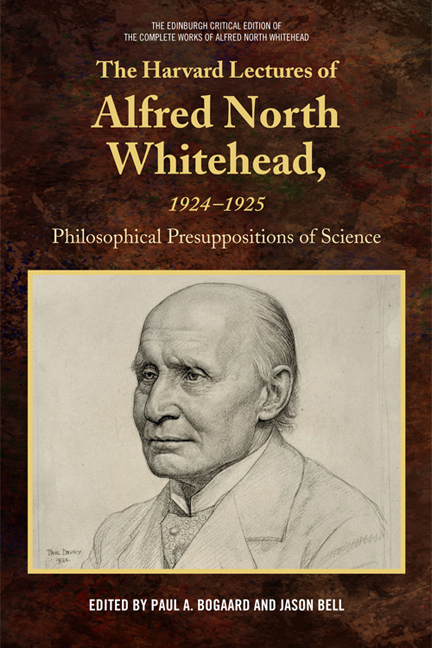Book contents
- Frontmatter
- Contents
- General introduction
- Editorial principles
- Acknowledgements
- Chronology for Alfred North Whitehead
- Published works of Alfred North Whitehead
- Introduction to The Harvard Lectures of Alfred North Whitehead, 1924–1925
- Emerson Hall lectures, Harvard Yard, 1924–1925: Notes taken by W. P. Bell and W. E. Hocking on Phil 3b, ‘Philosophical Presuppositions of Science’, delivered by Alfred North Whitehead
- Radcliffe College lectures, 1924–1925: Notes taken by Louise R. Heath on Phil 3b, ‘Philosophical Presuppositions of Science’, delivered by Alfred North Whitehead
- Whitehead Seminary, 1924–1925: Notes taken by W. E. Hocking on Phil 20h, ‘Seminary in Metaphysics’, delivered by Alfred North Whitehead
- Whitehead Seminary, 1924–1925: Notes taken by W. E. Hocking on Phil 20h, ‘Seminary in Metaphysics’, delivered by Alfred North Whitehead
- Appendix. Scans of original handwritten notes
- Index
Whitehead Seminary, 1924–1925: Notes taken by W. E. Hocking on Phil 20h, ‘Seminary in Metaphysics’, delivered by Alfred North Whitehead
from Whitehead Seminary, 1924–1925: Notes taken by W. E. Hocking on Phil 20h, ‘Seminary in Metaphysics’, delivered by Alfred North Whitehead
Published online by Cambridge University Press: 07 December 2017
- Frontmatter
- Contents
- General introduction
- Editorial principles
- Acknowledgements
- Chronology for Alfred North Whitehead
- Published works of Alfred North Whitehead
- Introduction to The Harvard Lectures of Alfred North Whitehead, 1924–1925
- Emerson Hall lectures, Harvard Yard, 1924–1925: Notes taken by W. P. Bell and W. E. Hocking on Phil 3b, ‘Philosophical Presuppositions of Science’, delivered by Alfred North Whitehead
- Radcliffe College lectures, 1924–1925: Notes taken by Louise R. Heath on Phil 3b, ‘Philosophical Presuppositions of Science’, delivered by Alfred North Whitehead
- Whitehead Seminary, 1924–1925: Notes taken by W. E. Hocking on Phil 20h, ‘Seminary in Metaphysics’, delivered by Alfred North Whitehead
- Whitehead Seminary, 1924–1925: Notes taken by W. E. Hocking on Phil 20h, ‘Seminary in Metaphysics’, delivered by Alfred North Whitehead
- Appendix. Scans of original handwritten notes
- Index
Summary
Whitehead, Seminary, October 10.
“An object is an existent in a particular mode of realization” “Reality requires particularity and limitation”
Entities as existences are isolated.
Fusion requires limitation.
Reality is the achievement of reactive significance of these entities one for another
Space-time is the locus of realization and the machinery of limitation.
Envisagement.
“Knowing is a highly complex example of envisagement” Cognition, envisaging its own envisagement Is the term corresponding to Bergson's intuition Images are not “in the mind” ; A knows B only as B disturbs A. “Green is there for the molecules of my brain”
Reactive significance. of A and B
Means (1) A taking account of B (envisagement)
(2) being causally influenced by B
(3) enjoying achievement.
Relational essence (of green)
How it can achieve relations within space time
Question:
Is all realization in space-time? If so, is mind real?
Is there any true process from the existent universal to the particular?
How can an eternal and omnipresent essence ‘take up relationship’? It neither changes nor ceases to exist, – there is no ‘from’ in the ‘to’
And there are no betweens in this alleged transition
In what sense do all the existents pre-exist?
They seem, in experience to EMERGE from the concrete and to exist only in our minds (Alexander, from nowhere)
Why suppose that all possibilities exist?
Whitehead. Seminary Oct. 17
Papers by Van der Walle and Shimer: restatements.
Questions relating to the fundamental position of the physical field, the function of the primates, and how ‘vibration of the primates’ is to be conceived.
The physical field is not fundamental but an abstraction (Essentially in Hegel's sense?)
“The finiteness of the event essentially clamors for its relation to the beyond”
The meaning of the theory of “primates” – a warning Quantum theory need not “imply discontinuity of space-time” Conceive electrons as vibrant rather than as passive charges Space-time as “uniform objects”, whereas molecules are not
Not all objects are complex: a sense-datum, black
Space time may be abstractions, but
All realization is in space-time
Thinking of a name is not a realization?
A thought process is a weaker degree of reality (Can space-time then be realized?)
Brain molecules may take account of a thought, subconscious (Is there any sense in this?)
- Type
- Chapter
- Information
- The Harvard Lectures of Alfred North Whitehead, 1924-1925Philosophical Presuppositions of Science, pp. 525 - 534Publisher: Edinburgh University PressPrint publication year: 2017

